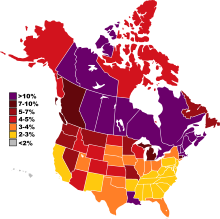 French Americans and French Canadians as percent of population by state and province.[a] | |
| Total population | |
| Including French-Canadian: 8,053,902 (2.4%) alone or in combination | |
| Regions with significant populations | |
| Predominantly in New England and Louisiana with smaller communities elsewhere; largest numbers in California. Significant communities also exist in New York, Wisconsin, and Michigan, as well as throughout the Mid-Atlantic. | |
| Languages | |
| French, Louisiana Creole, English, Franglais | |
| Religion | |
| Predominantly Christian (Majority Catholic, minority Protestant) | |
| Related ethnic groups | |
| French Canadians, French-Canadian Americans, Basque Americans, Belgian Americans (Wisconsin Walloons), Breton Americans, Catalan Americans, Corsican Americans |
| Part of a series of articles on the |
| French people |
|---|
 |
French Americans or Franco-Americans (French: Franco-américains) are citizens or nationals of the United States who identify themselves with having full or partial French or French-Canadian heritage, ethnicity and/or ancestral ties.[2][3][4] They include French-Canadian Americans, whose experience and identity differ from the broader community.
The state with the largest proportion of people identifying as having French ancestry is Maine, while the state with the largest number of people with French ancestry is California. Many U.S. cities have large French American populations. The city with the largest concentration of people of French extraction is Madawaska, Maine, while the largest French-speaking population by percentage of speakers in the U.S. is found in St. Martin Parish, Louisiana.
Country-wide, as of 2020, there are about 9.4 million U.S. residents who declare French ancestry[5] or French Canadian descent, and about 1.32 million[6] per the 2010 census, spoke French at home.[7][8] An additional 750,000 U.S. residents speak a French-based creole language, according to the 2011 American Community Survey.[9]
Franco-Americans are less visible than other similarly sized ethnic groups and are relatively uncommon when compared to the size of France's population, or to the numbers of German, Italian, Irish or English Americans. This is partly due to the tendency of Franco-American groups to identify more closely with North American regional identities such as French Canadian, Acadian, Brayon, Louisiana French (Cajun, Creole) than as a coherent group, but also because emigration from France during the 19th century was low compared to the rest of Europe. Consequently, there is less of a unified French American identity as with other European American ethnic groups, and Americans of French descent are highly concentrated in New England and Louisiana. Nevertheless, the French presence has had an outsized impact on American toponyms.
Cite error: There are <ref group=lower-alpha> tags or {{efn}} templates on this page, but the references will not show without a {{reflist|group=lower-alpha}} template or {{notelist}} template (see the help page).
- ^ "IPUMS USA". University of Minnesota. Retrieved October 12, 2022.
- ^ "French Americans – Dictionary definition of French Americans | Encyclopedia.com: FREE online dictionary". www.encyclopedia.com. Retrieved January 18, 2018.
- ^ "Franco-American Alliance | French-United States history [1778]". Encyclopedia Britannica. Retrieved January 18, 2018.
- ^ Barkan, Elliott Robert (January 17, 2013). Immigrants in American History: Arrival, Adaptation, and Integration [4 volumes]: Arrival, Adaptation, and Integration. ABC-CLIO. ISBN 9781598842203.
- ^ "Table B04006 - People Reporting Ancestry - 2020 American Community Survey 5-Year Estimates". United States Census Bureau. Retrieved October 12, 2022.
- ^ U.S. Census Bureau (2003). "Language Use and English-Speaking Ability: 2000" (PDF). U.S. Department of Commerce, Economics and Statistics Administration. Retrieved March 2, 2012.
- ^ "LANGUAGE SPOKEN AT HOME BY ABILITY TO SPEAK ENGLISH FOR THE POPULATION 5 YEARS AND OVER : Universe: Population 5 years and over : 2010 American Community Survey 1-Year Estimates". Factfinder2.census.gov. Archived from the original on February 12, 2020. Retrieved March 14, 2015.
- ^ Shin, Hyon B.; Bruno, Rosalind (October 2003). "Language Use and English-speaking Ability: 2000" (PDF). 2000 U.S. Census. U.S. Census Bureau.
- ^ Ryan, Camille (2013). "Language Use in the United States: 2011 – American Community Survey Reports" (PDF). U.S. Census. p. 3. Archived from the original (PDF) on February 5, 2016. Retrieved September 20, 2015.